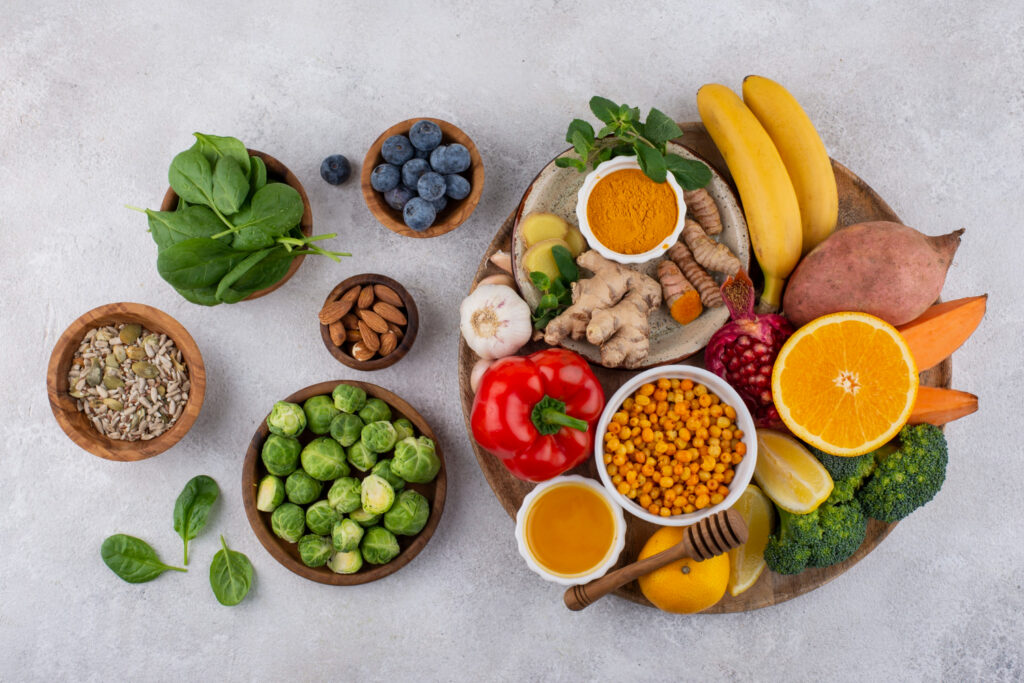
Table of Contents
Overview
Potassium is a vital mineral and electrolyte that plays an essential role in maintaining the body’s overall health. It contributes to regulating fluid balance, ensuring proper nerve function, and maintaining healthy blood pressure. Despite its critical role, many people fail to meet their daily potassium needs, which can lead to health problems such as muscle cramps, fatigue, and high blood pressure. This article explains why potassium is so important, how much you need, and the best ways to get it from your diet
Why Is Potassium Important?
Potassium is one of the most important electrolytes in your body, responsible for various functions that keep you healthy. Some key roles include
Related : Health Benefits of Red Bananas: Fiber Potassium and More
- Regulating Fluid Balance: Potassium works alongside sodium to control the balance of fluids inside and outside cells. This balance is crucial for the body’s normal function, as too much or too little fluid can disrupt cellular processes.
- Supporting Nerve and Muscle Function: Potassium helps conduct electrical signals that control nerve responses and muscle contractions. Without enough potassium, muscles can become weak, and nerve signals may be disrupted, leading to problems like cramps or tingling sensations.
- Maintaining Heart Health: Potassium plays a major role in controlling blood pressure by neutralizing the harmful effects of sodium. It helps relax blood vessels and keeps blood pressure in check, reducing the risk of heart disease and stroke.
How Much Potassium Do You Need?
The recommended daily intake of potassium can vary based on age, sex, and life stages, such as pregnancy or breastfeeding. On average:
- Adults should consume between 2,500 to 3,000 mg of potassium per day.
- Teenagers typically need around 2,500 to 3,500 mg daily to support their growth and development.
- Pregnant and breastfeeding women may require slightly higher amounts to support their own health and that of their baby.
For individuals with certain health conditions, such as chronic kidney disease (CKD), the required intake may be lower due to the risk of potassium buildup in the body. Always consult with a healthcare provider for personalized recommendations.
Signs of Potassium Deficiency (Hypokalemia)
When potassium levels drop too low, a condition known as hypokalemia occurs. This deficiency can cause several symptoms, ranging from mild to severe, depending on how low potassium levels have become. Some signs of potassium deficiency include:
- Muscle Weakness and Cramps: One of the earliest signs of hypokalemia is muscle cramping or weakness, especially during exercise or strenuous activity.
- Fatigue: Low potassium levels can make you feel constantly tired or weak, as cells struggle to generate enough energy.
- Irregular Heartbeat: Severe potassium deficiency can affect the heart’s rhythm, leading to abnormal heartbeats or arrhythmias.
If left untreated, hypokalemia can cause serious health problems, including digestive issues, paralysis, or even heart failure in extreme cases.
Best Dietary Sources of Potassium
It is essential to get enough potassium from your diet because your body does not produce it naturally. Fortunately, many everyday foods are rich in potassium, making it easy to meet your daily requirements if you follow a balanced diet. Here are some of the top potassium-rich foods to consider:
- Bananas: A medium banana contains approximately 422 mg of potassium, making it a convenient and tasty option for boosting your intake.
- Sweet Potatoes: A single baked sweet potato provides about 542 mg of potassium, plus it’s rich in fiber and vitamin A.
- Spinach: Dark leafy greens like spinach offer a large amount of potassium, with cooked spinach containing around 839 mg per cup.
- Avocados: Half an avocado contains about 485 mg of potassium and is also rich in healthy fats and fiber.
- Beans and Lentils: A cup of cooked beans or lentils can provide between 600 to 731 mg of potassium, making them excellent plant-based sources of this vital nutrient.
- Fish: Fatty fish such as salmon and tuna are not only rich in omega-3 fatty acids but also provide around 400 to 500 mg of potassium per serving.
Incorporating a variety of these foods into your diet will help ensure you meet your potassium needs daily.
Potassium vs. Sodium: Why the Balance Matters
Maintaining the right balance between potassium and sodium is crucial for your overall health. The modern Western diet tends to be high in sodium and low in potassium, which can lead to high blood pressure, heart disease, and other health issues.
Potassium helps counteract the negative effects of sodium by relaxing the walls of blood vessels and helping the kidneys flush out excess sodium. For those with high blood pressure, increasing potassium intake while reducing sodium can have a significant impact on improving cardiovascular health and reducing the risk of strokes and heart attacks.
Who Should Limit Potassium Intake?
While potassium is important for most people, some individuals need to monitor their intake closely. Those with chronic kidney disease or people taking certain medications (such as diuretics or ACE inhibitors) may be at risk of developing hyperkalemia—a condition where too much potassium accumulates in the blood. This can cause serious complications, such as dangerous heart arrhythmias.
If you fall into any of these categories, it’s important to consult your healthcare provider to determine the right amount of potassium for your needs.
The Takeaway
Potassium is a key nutrient that supports vital bodily functions, from muscle contractions to maintaining a healthy heart. Ensuring that you meet your daily potassium requirements can help prevent deficiencies that lead to issues like muscle cramps, fatigue, and high blood pressure. By eating a balanced diet rich in potassium-packed foods like bananas, sweet potatoes, spinach, and beans, you can easily meet your daily intake and protect your long-term health
- Potassium is essential for regulating fluid balance, muscle function, and heart health.
- Adults should aim for 2,500 to 3,000 mg of potassium daily.
- Potassium-rich foods include bananas, sweet potatoes, spinach, avocados, and beans.
- Keep potassium and sodium in balance to promote heart health and lower blood pressure.
- Certain individuals, such as those with kidney disease, may need to limit their potassium intake.
By prioritizing potassium in your diet, you can ensure your body functions smoothly and reduce your risk of serious health complications in the future
Frequently Asked Questions
- Why is potassium important for my health?
Potassium is crucial for maintaining proper fluid balance, supporting nerve function, and regulating muscle contractions. It also plays a significant role in maintaining healthy blood pressure by neutralizing the effects of sodium, reducing the risk of heart disease and stroke. - How much potassium do I need each day?
The recommended daily intake for adults is between 2,500 to 3,000 mg. However, the specific amount you need may vary based on age, sex, and health conditions. For example, pregnant women or individuals with certain conditions, like kidney disease, may have different requirements. - What are some good food sources of potassium?
Potassium-rich foods include bananas, sweet potatoes, spinach, avocados, beans, lentils, and fatty fish like salmon. Incorporating a variety of these foods into your diet can help you meet your daily potassium needs. - What are the signs of potassium deficiency?
Symptoms of potassium deficiency, or hypokalemia, include muscle cramps, fatigue, weakness, and in severe cases, abnormal heart rhythms. If you experience these symptoms, it’s important to speak with a healthcare provider.











